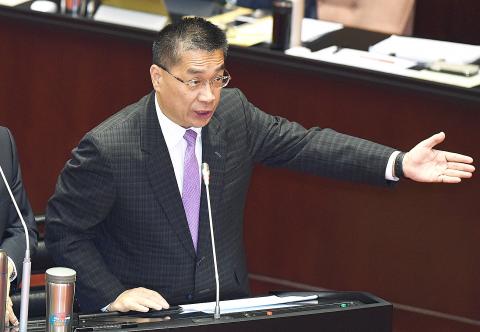There is no ban on wearing masks at rallies, but the government does not encourage the practice either, Minister of the Interior Hsu Kuo-yung (徐國勇) told lawmakers yesterday.
As far as he could recall, the government has never banned masks at rallies, Hsu said during an interpellation session on the legislative floor, after Chinese Nationalist Party (KMT) Legislator Lo Ming-tsai (羅明才) asked him if people could wear masks at protests.
Demonstrations nowadays are relatively peaceful compared with those seen during the nation’s democratic movement, he added.

Photo: Liao Chen-huei, Taipei Times
Hsu was foolish to encourage people to wear masks, as it would make identification difficult if the rallies turned violent, Lo said.
The premier also defended the no-mask-ban policy.
Taiwan is a free, democratic and liberal nation, so the government would not issue a mask ban, but the government would not tolerate masked thugs, such as the man who tossed red paint on Hong Kong singer and rights advocate Denise Ho (何韻詩) on the sidelines of a rally last month, Premier Su Tseng-chang (蘇貞昌) said.
However, that incident was a case of organized crime, he said.
Yesterday’s questions came after National Police Agency Director-General Chen Ja-chin (陳家欽) on Sunday said that Article 14 of the Assembly and Parade Act (集會遊行法) stipulates that authorities “shall put necessary restrictions” on “any disguise that might make personal identification difficult,” effectively prohibiting the use of masks.
However, that did not mean that police would ban protesters from wearing a mask or other covering, Chen said, adding that police would only check the identity of people they think might pose a potential threat to a rally.
Additional reporting by CNA

TRAFFIC SAFETY RULES: A positive result in a drug test would result in a two-year license suspension for the driver and vehicle, and a fine of up to NT$180,000 The Ministry of Transportation and Communications is to authorize police to conduct roadside saliva tests by the end of the year to deter people from driving while under the influence of narcotics, it said yesterday. The ministry last month unveiled a draft of amended regulations governing traffic safety rules and penalties, which included provisions empowering police to conduct mandatory saliva tests on drivers. While currently rules authorize police to use oral fluid testing kits for signs of drug use, they do not establish penalties for noncompliance or operating procedures for officers to follow, the ministry said. The proposed changes to the regulations require

The Executive Yuan yesterday announced that registration for a one-time universal NT$10,000 cash handout to help people in Taiwan survive US tariffs and inflation would start on Nov. 5, with payouts available as early as Nov. 12. Who is eligible for the handout? Registered Taiwanese nationals are eligible, including those born in Taiwan before April 30 next year with a birth certificate. Non-registered nationals with residence permits, foreign permanent residents and foreign spouses of Taiwanese citizens with residence permits also qualify for the handouts. For people who meet the eligibility requirements, but passed away between yesterday and April 30 next year, surviving family members

Taiwanese officials are courting podcasters and influencers aligned with US President Donald Trump as they grow more worried the US leader could undermine Taiwanese interests in talks with China, people familiar with the matter said. Trump has said Taiwan would likely be on the agenda when he is expected to meet Chinese President Xi Jinping (習近平) next week in a bid to resolve persistent trade tensions. China has asked the White House to officially declare it “opposes” Taiwanese independence, Bloomberg reported last month, a concession that would mark a major diplomatic win for Beijing. President William Lai (賴清德) and his top officials

The German city of Hamburg on Oct. 14 named a bridge “Kaohsiung-Brucke” after the Taiwanese city of Kaohsiung. The footbridge, formerly known as F566, is to the east of the Speicherstadt, the world’s largest warehouse district, and connects the Dar-es-Salaam-Platz to the Brooktorpromenade near the Port of Hamburg on the Elbe River. Timo Fischer, a Free Democratic Party member of the Hamburg-Mitte District Assembly, in May last year proposed the name change with support from members of the Social Democratic Party and the Christian Democratic Union. Kaohsiung and Hamburg in 1999 inked a sister city agreement, but despite more than a quarter-century of